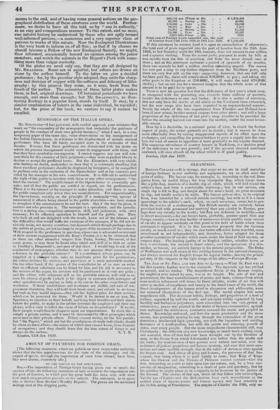ECONOMICS OF THE ITALIAN OPERA.
Mr. SPECTATOR—I had just read, with cordial approval, your strictures last week on "the coxcombry of the newspapers that undertake the guidance of people in the conduct of their own private business," when I met, in a con- temporary paper of the same day, some observations on the management of the Italian Opera-house, in reference to the displacement of certain musical performers who have till lately occupied seats in the orchestra of that theatre. It seems that these gentlemen are dissatisfied with the terms on which the present management would renew its engagement with them, and that they have seceded in consequence. I cannot suppose any one will cen- sure them for this exercise of their judgment ;—they were at perfect liberty to decline or accept the proffered terms. But the Examiner, with very charit- able feelings no doubt, undertakes to show that it is extremely shocking that these excellent performers should be displaced by foreigners, or be compelled to perform only in the orchestra of the Opera-house and at the concerts pro- vided by the manager at his own concert-room. It is difficult to understand the right nf the public to interfere with these or any other arrangements " be- hind the curtain." The establishment of the Opera-house is essentially pri- vate; and all that the public are entitled to regard, are the performances. These it is the interest of the manager to make attractive, and there is room for public complaint only when they are unsatisfactory. For unquestionably, the Opera-house, existing on the principle of a monopoly—the species of amusement it affords being denied to the public elsewhere—we have reason to complain if the entertainment be not the best. But if the best be given, it matters not who provides it. The manager is a speculator, and the specula- tion is a daring one,—requiring enterprise, skill, and judgment, with strict economy, for its effective operation to himself and the public too: They who look oit and are delighted with the result, know not of the labours, and the difficulties that would baffle the exertions of the manager, if he did not de- cisively resist, not merely extortion, but demands which though perhaps due to the merits of genius, are yet too large in respect of the resources of the concern. With respect to the gentlemen in question, whose case is advocated on account of their ancient engagementwith the King's Theatre, it is to be observed, that as there are other attractive singers than Pasta, Sontag, Pee.saroni, et hoc mane genes, so may there be found other talent and skill of as high an order as Lindley's, Dragonetti's, and men of that class. I would beg to ask of the conductors of newspapers, whether they do not manage their concerns with
reference to the probable returns ? If a contributor, whose place can be supplied at a cheetper rate, asks an inordinate price for his productions, the editor declines his services, and purchases at a more reasonable market On the other hand, if the genius of the contributor be of so rare au order that no efficient .substitute can be found for him, and his aid is necessary to the success of the paper, his services will be purchased at almost any price ; and the editor, with reference still to his probable returns, will seek to se- cure his chance of profit (which is his object in common with managers of other speculations) by paying as little as he can to his other contributors and workmen. If these contributors and workmen are skilful, and sure of em- ployment elsewhere, they will hold their heads erect, and submit to no terms but such as they would impose—they ask the highest price for their services which can be procured for them. Would it be decent in me or you, Mr. Spectator, to interfere in their behalf, and bring their troubles and their merits before the public, to make it the arbiter between the employed and their em- ployer, with a view to inflict the curse of failure on his prudence ? If we did, these pelvic would then be eloquent upon our impertinence. In short, this is simply a private matter, and it must be determined by th'ese principles which move men in their private affairs. If they commit wrong, let the law punish : but "the Papers," which are but the mouthpieces of single individuals, should be silent on these affitirs—the nature of which they cannot know, from diversity of occupation ; and they should learn that the true nature of things is not


















 Previous page
Previous page